Mambo began his drumming and Sabina began to look feverish and trapped as she had looked the first time Jay had seen her.
Dressed in red and silver, she evoked the sounds and imagery of fire engines as they tore through the streets of New York, alarming the heart with the violent accelerations of catastrophes.
All dressed in red and silver, she evoked the tearing red and silver siren cutting a pathway through the flesh.
The first time he had looked at her he had felt: “Everything will burn!”
Out of the red and silver and the long cry of alarm to the poet who survives (even if secretly and invisibly) in every human being as the child survives in him (denied and disguised), to this poet she threw an unexpected challenge, a ladder in the middle of the city and ordained: “Climb!”
As she appeared, all orderly alignment of the city gave way before this ladder one was invited to climb, standing straight in space like the ladder of Baron Munchhausen which led to the sky.
Only her ladders led to fire.
Jay laughed and shook his head from side to side at the persistence of the image he had of Sabina. After seven years she still had not learned to sit still. She talked profusely and continuously with a feverish breathlessness like one in fear of silence. She sat as if she could not bear to sit for long and when she rose to buy cigarettes she was equally eager to return to her seat. Impatient, alert, watchful, as if in dread of being attacked, restless and keen. She drank hurriedly, she smiled so swiftly that he was never certain it had been a smile, she listened only partially to what was being said to her, and even when someone in the bar leaned over and shouted out her name in her direction she did not respond at first, as if it were not her own.
Her way of looking at the door of the bar as if expecting the proper moment to make her escape, her erratic and sudden gestures, her sudden sulky silences. She behaved like someone who had all the symptoms of guilt.
Above the iridescence of the candles, above the mists of cigarette smoke and the echoes of the cajoling blues, Sabina was aware that Jay was meditating on her. But it would be too dangerous to question him; he was a satirist, and all she would obtain from him at this moment was a caricature which she could not take lightly or dismiss, and which would, in her present mood, add heavily to the weights pulling her downward.
Whenever Jay shook his head kindly, with the slow heavy playfulness of a bear, he was about to say something devastating, which he called his brutal honesty. And Sabina would not challenge this. So she began a swift, spiraling, circuitous story about a party at which indistinct incidents had taken place, hazy scenes from which no one could distinguish the heroine or the victim. By the time Jay felt he recognized the place (Montparnasse, seven years ago, a party at which Sabina had actually been jealous of the strong bond between Jay and Lillian which she was seeking to break), Sabina was already gone from there, and talking as in a broken dream, with spaces, reversals, retractions and galloping fantasies.
She was now in Morocco, visiting the Arabian baths with the native women, sharing their pumice stone, and learning from the prostitutes how to paint her eyes with kohl from the market place.
“ It’s coal dust,“explained Sabina, “ and you place it right inside of the eyes. It smarts at first, and it makes you cry, but that spreads it out on the edge of the eyelids and that is how they get that shiny, coal black rim around the eyes. ”
“ Didn’t you get an infection? “asked Jay.
“ Oh, no, the prostitutes are very careful to have the kohl blessed at the mosque. ”
Everyone laughed at this—Mambo who had been standing near, Jay, and two indistinct personages who had been sitting at the next table but who had been sliding their chairs to listen to Sabina. Sabina did not laugh; she was invaded by another memory of Morocco. Jay could see the images passing through her eyes like a film being censored. He knew she was busy eliminating other stories she was about to tell; she might even be regretting the story about the bath, and now it was as if all she had said had been written on a huge blackboard and she took a sponge and effaced it all by adding: “Actually, this did not happen to me. It was told to me by someone who went to Morocco,” and before anyone could ask: “Do you mean that you never went to Morocco at all” she continued to confuse the threads by adding that this was a story she had read somewhere or heard at a bar, and as soon as she had erased in the minds of her listeners any face which could be directly attributed to her own responsibility, she began another story…
The faces and the figures of her personages appeared only half-drawn, and when Jay had barely begun to reconstruct the missing fragment (when she told about the man who was polishing his own telescope glass she did not want to say too much for fear Jay would recognize Philip whom he had known in Vienna and whom they all called playfully in Paris: “Vienna-as-it-was-before-the-war”), when Sabina would interpose another face and figure as one does in dreams, and when Jay had laboriously decided she was talking about Philip (with whom he was sure now she had had an affair), it turned out that she was no longer talking about a man polishing a telescope glass with the umbrella hung up in the middle of the room above his work, but about a woman who continued to play the harp at a concert in Mexico City during the revolution when someone had shot at the lights of the concert hall, and she had felt that if she continued to play she would prevent a panic; and as Jay knew this story had been told of Lillian, and that it was not as a harpist but as a pianist that Lillian had continued to play, Sabina became aware that she did not want to remind Jay about Lillian as the memory would be painful to him, for Sabina’s seduction of Jay in Paris had been in part responsible for Lillian’s desertion of him, and so she quickly reversed her story, and it was Jay who wondered whether he was not hearing right, whether perhaps he had been drinking too much and had imagined she was talking about Lillian, because actually at this very moment she was talking about a young man, an aviator, who had been told not to look into the eyes of the dead.
Jay could not retain any sequence of the people she had loved, hated, escaped from, any more than he could keep track of her very personal appearance as she herself would say: “At that time I was a blond, and I wore my hair very short,” or “This was before I was married when I was only nineteen” (and once she had told him she had been married at the age of eighteen). Impossible to know who she had betrayed, forgotten, married, deserted, or clung to. It was like her profession. The first time he had questioned her, she had answered immediately: “I am an actress.” But when he pressed her, he could not find in what play she had acted, whether she had been a success or a failure, whether, perhaps, (as he decided later) she had merely wished to be an actress but had never worked persistently enough, seriously enough except in the way she was working now, changing personalities with such rapidity that Jay was reminded of a kaleidoscope.
He sought to capture the recurrence of certain words in her talk, thinking they might be used as keys, but if the word “actress,” “miraculous,” “travel,” “wandering,” “relationship” did occur frequently, it remained impossible to know whether or not she used them in their literal sense or symbolically, for they were the same to her. He had heard her say once: “When you are hurt, you travel as far as you can from the place of the hurt,” and when he examined her meaning found she was referring to a change of quarters within fifty blocks in the city of New York.
Читать дальше












